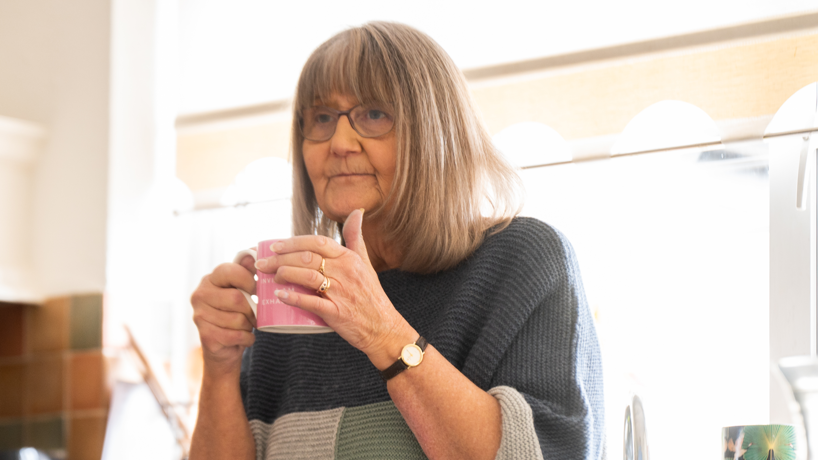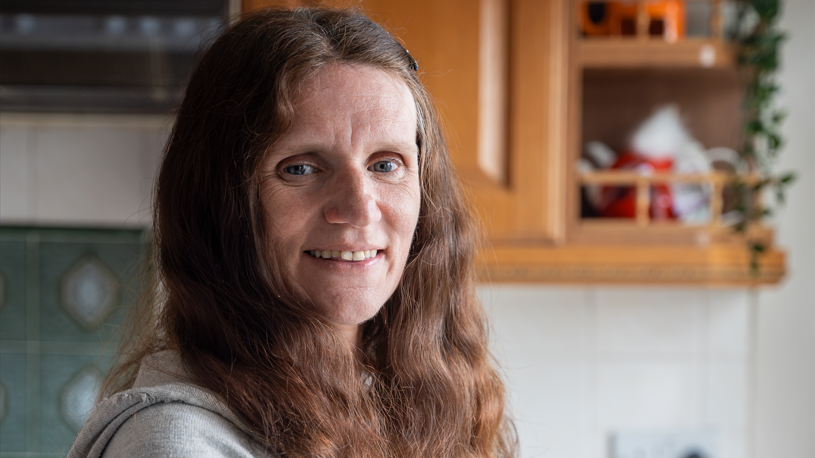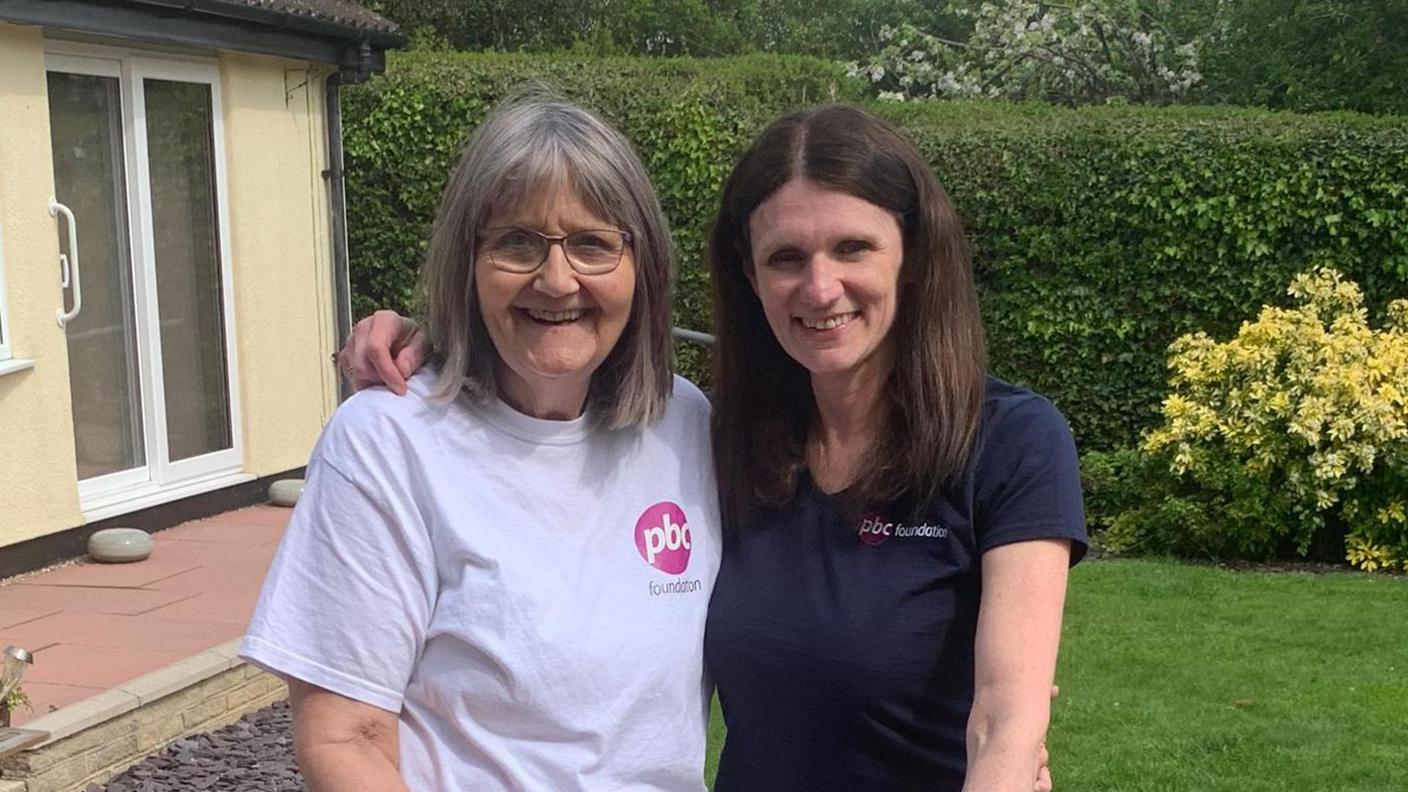'Doctors mistook my liver disease for menopause'

Gill Rich was 50 when she was diagnosed with a rare, chronic liver disease that left her severely fatigued
- Published
When Gill Rich found herself itching "under the skin" with body aches "all over" about 20 years ago, doctors put it down to menopause.
The now 71-year-old from Bingham in Nottinghamshire knew something else was wrong, finding herself so fatigued some days, it felt as though she was "walking through treacle", she said.
About six months after her first GP visit, another doctor told her she had "something the whole surgery had never heard of".
She was diagnosed with primary biliary cholangitis (PBC) at the age of 50 - a rare, incurable liver disease in which the bile ducts in the organ become inflamed.
It can cause painful joints and bones, severe itching all over the body or in specific areas, a dry mouth and fatigue, according to the NHS.
According to the National Institute for Health and Care Excellence (NICE), there are about 25,000 people living with PBC in the UK and about 90% of them are women.
When Ms Rich was diagnosed, she said she had almost all the symptoms.
'Isolated feeling'
"I would plunge my feet into a bowl of ice cold water and that would sort of change the mindset, dealing with the itch," she said.
"Or my arms – I would sometimes scratch them so much, particularly during the night, I would draw blood."
But with the condition being "invisible" and not knowing anyone else with it, Ms Rich said she kept the diagnosis mostly to herself.
She said: "How do you say to somebody I'm walking through treacle, I'm really fatigued, my bones hurt – when I looked fine?"
After years of feeling "quite isolated", Ms Rich approached a charity that supports people with the condition, the PBC Foundation, and subsequently met a fellow patient who had set up a peer support group in Nottingham.
Wendy Wheat, 53, from Arnold in Nottinghamshire, established the support group after she was diagnosed in 2012.
But it was a long five years of misdiagnoses, while trying to manage what she said was "debilitating" fatigue and a persistent itch on the arches of her feet, before Ms Wheat got answers.

Wendy Wheat said she was usually a productive and busy person but some days found herself having to "give herself a talking to" to battle through fatigue
"My liver function tests were off the charts, is what they said to me, but all they kind of asked me was how much I drank," Ms Wheat said.
She said she was quizzed about her alcohol consumption on more than one occasion and at one point was told "everyone gets tired", when she described her fatigue to a doctor.
"Doctors made me feel like I was going mad," she said. "It affected my daily life massively."
And like Ms Rich - of whom she became a close friend - she also suffered from a relentless itch.
"There was no relief from it, my feet were itching all the time, I couldn't do anything," she said.
"I used to go to work and go to the toilet to scratch them. I used to be driving and wanted to pull over to scratch them – I even took a knife to them a few times."
Between trying to hold down a full-time job and looking after her children who were school age at the time, Ms Wheat said she was "dragging [herself] around".
Since their diagnoses, both women have continued with "limited treatment" and have learned to manage their symptoms, some of which have subsided or changed over time.
Despite both being on treatment, they continue to struggle with fatigue.

The pair have become close friends through their shared experience
Now it is hoped a new daily pill could help thousands of patients living with the disease.
On Tuesday, NICE - which recommends medicines for use on the NHS - recommended a daily pill for people with the disease, called Elafibranor.
The medication will help to improve liver performance by reducing bile acid production and liver inflammation, said NICE.
The organisation said Elafibranor would be suitable for patients who had not responded well to existing treatment called ursodeoxycholic acid.
A NICE spokesman said: "We are very pleased to have been able to recommend this new daily pill for people with primary biliary cholangitis, a type of chronic liver disease.
"This is a rare condition which can have a significant impact on quality of life, with symptoms including bone and joint aches, fatigue and itchy skin.
"There are limited treatment options to help people manage the disease, particularly if it has not responded well enough to ursodeoxycholic acid (UDCA), or if UDCA can’t be tolerated so the recommendation of Elafibranor is good news for patients."
Get in touch
Tell us which stories we should cover in Nottingham
Follow BBC Nottingham on Facebook, external, on X, external, or on Instagram, external. Send your story ideas to eastmidsnews@bbc.co.uk, external or via WhatsApp, external on 0808 100 2210.